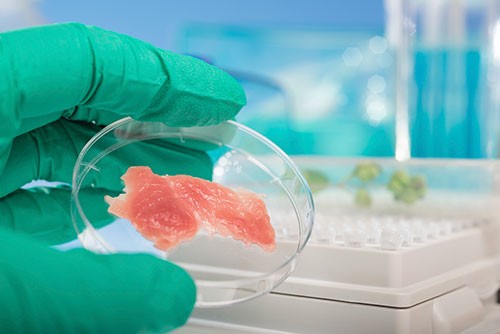
by Amanda Smith, Associate Editor
Meat. As a nation's economy grows and develops, protein, from meat and other sources, is often the first dietary addition its citizens seek.
But, for those of us residing in already industrialized nations, could the day come when beef is not what's for dinner anymore?
Globally, meat consumption has risen steadily with time. According to the Food and Agriculture Organization of the United Nations (FAO), citizens in these countries are on track to consume nearly 210 pounds of meat per person this year. The FAO predicts that by 2030, we'll add another 10 pounds to that total.
Meanwhile, our counterparts in the developing world fall well behind, consuming closer to 70 pounds per person per year. Globally, the average human is expected to consume just shy of 100 pounds of meat by 2030.
Critics of animals for human food consumption often note that meat production comes with an animal welfare and environmental costs.
One lab, led by Mark Post at Maastricht University in the Netherlands, is on course to capitalize on the positives of meat consumption while mitigating the perceived negatives.
It's likely they'll bring synthetic, lab-grown meat, or shmeat, to your local market.
With time, Post has managed to cut production costs by 80 percent, and he feels it won't be long before they reach their target cost of $30 per pound, noted a recent Washington Post article.
Post's process capitalizes on muscle tissues' natural behavior. When muscle tissue is damaged, the body relies on myosatellite cells to repair it. These cells can be taken from an animal without causing harm, and they tend to form muscle fibers as they reproduce.
What results are tiny strips of tissue, noted the article. Approximately 20,000 strips are required to produce a 5-ounce burger.
The question of whether society will warm to eating Post's lab-grown shmeat remains.
In a locally-grown, all-natural world, lab-grown anything is rarely well received.
(c) Hoard's Dairyman Intel 2015
May 26, 2015








